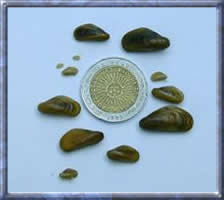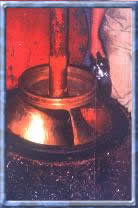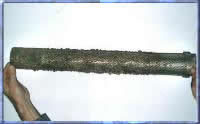
Likewise, golden mussel Limnoperna fortunei, settlements increase operating costs (1) because they produce:
-
Reduction in the efficiency of pumps and therefore cause and increase in energy consumption to achieve normal operation.
-
Increase in piping corrosion because of proliferation of other undesired biological agents like fungi or bacteria.

Heat exchanger of a hydroelectric power plant.

Pumps of water of a potable plant macrofouling can be observed.
- Deadlock of systems for cleaning o replacing piping, filters, etc.
- To sum up, the
economical importance outlined here can be characterized by:
* Costs of hiring specialists for cleaning.
* Costs of replacing piping and other components.
* Increase of operative costs because of reduced system efficiency.
Limnoperna fortunei's morpho-functional characteristics, as well as the absence of natural predators and parasites that could control it's population density can cause serious difficulties because of the rapid spread of this species throughout the freshwater basins of the Mercosur countries. The lack of awareness of society about this economical and environmental problem, and the probable execution of hydrological projects like the "Hidrovía" increase the risk. Increased continuous commercial traffic among Mercosur member countries will doubtless give rise to a quick expansion of this invading species.

Cartridge of a self-cleaning filter of a generating plant of energy.
(1)
Darrigran, J. O. 2006. Gobernabilidad de los recursos hídricos y las bioinvasiones; pp. 140-154. En: Darrigran & Damborenea (Eds.) Bio-invasion del mejillón dorado en el continente americano. Edulp, La Plata, 2006. 220 pág.
For
more information contact
us by e-mail:
invasion@fcnym.unlp.edu.ar
gdarrigran@hotmail.com
gdarrigran@malacología.com.ar